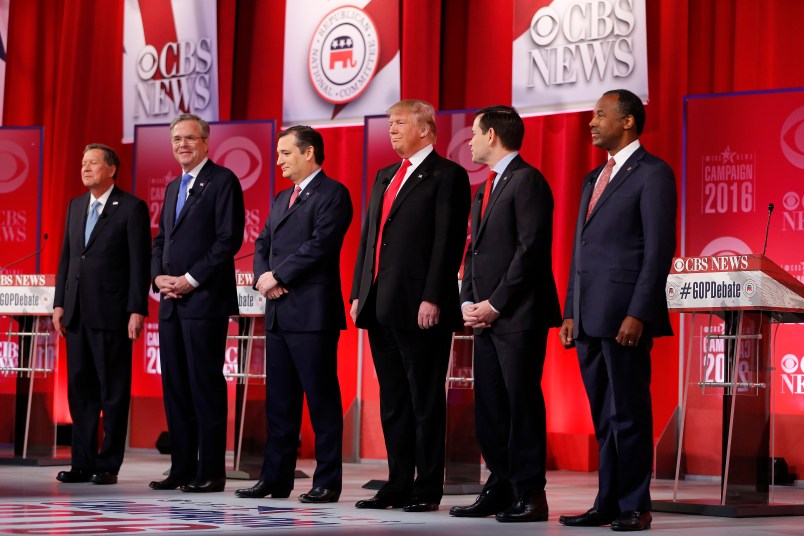The GOP’s presidential contenders had an opportunity at Saturday’s CBS debate to weigh in on what should happen next after the unexpected death of Justice Antonin Scalia. The candidates for the most part urged the GOP Senate to block any appointees put forward by President Obama.
Donald Trump perhaps most explicitly acknowledged the partisan dynamics of the coming fight over a potential Supreme Court nomination, when asked if he would put forward a nomination if he was in Obama’s position.
“Well, I can say this– if the president– and if I were president now– I would certainly want to try and nominate a justice,” Trump said, adding that he believed Obama would move forward with nomination, too.
“I think he is going to do it whether I’m okay with it or not. It’s up to Mitch McConnell and everybody else to stop it. It’s called delay, delay, delay,” he said.
Ohio Gov John Kasich (R) condemned how quickly Scalia’s death was politicized and suggested Obama should nominate someone who would “have unanimous approval and such widespread approval across the country that this could happen without a lot of recrimination.”
He said, however, that he didn’t believe that would happen.
“And so I believe the president should not move forward, and I think that we ought to let the next president of the United States decide who is going to run that Supreme Court with a vote by the people of the United States of America,” Kasich said.
Neurosurgeon Ben Carson was asked to speak to what the Constitution says about the current scenario, since Carson wrote a book about the Constitution.
“Well, the Constitution actually doesn’t address that particular situation,” Carson said. “But the fact of the matter is, the Supreme Court, obviously, is a very important part of our governmental system, and when our constitution was put in place, the average age of death was under 50. And, therefore, the whole concept of lifetime appointments for Supreme Court judges and federal judges was not considered to be a big deal.”
During a later question Carson clarified that he knew the Constitution grants the President the responsibility of nominating a Supreme Court justice.
Sen. Marco Rubio (R-FL) reiterated the conservative consensus that Obama should not put forward a nominee and denied that he was ever in favor of dropping the filibuster threshold so Supreme Court nominees could pass in the Senate with only 50 votes.
“According to the changes Harry Reid made, appellate judges can now be appointed by simple majority, but not Supreme Court justices and today I think you see the wisdom of why we don’t that want to change,” Rubio said.
Former Florida Gov. Jeb Bush (R), after laying out what he would look for in a Supreme Court nominee, admitted that Obama has the constitutional right to nominate a replacement for Scalia.
“Of course, the President, by the way, has every right to nominate Supreme Court justices. I’m an Article 2 guy in the Constitution. We’re running for the president of the United States. We want a strong executive for sure,” Bush said. “But in return for that, there should be a consensus orientation on that nomination, and there’s no doubt in my mind that Barack Obama will not have a consensus pick when he submits that person to the Senate.”
Sen. Ted Cruz (R-TX), who was one of the first to call for Senate Republicans to block any Obama nominee, was asked how long before an election a president should no longer put forward a Supreme Court nomination.
“Well, we have 80 years of precedent of not confirming Supreme Court justices in an election year,” Cruz said, before moderator John Dickerson interrupted him to remind him the Justice Anthony Kennedy was confirmed in 1988.
“The stakes of this election, for this year, for the Senate, the Senate needs to stand strong and say we’re not gonna give up the U.S. Supreme Court for a generation by allowing Barack Obama to make one more liberal appointee,” Cruz said.







Before the night is over, I expect one of them to suggest nominating the 2nd amendment to the Supreme Court.
God, I am so sick of these people. Please, asteroid, hurry up.
Uhm, is someone going to tell them they aren’t in charge of shit yet?
Don’t bother telling Carson, he won’t understand.
Idiots, megalomaniacs and crooks, each one.
Damn, Trump sized up the GOP’s agenda, the one they’ve had for the last eight years. Sheesh.